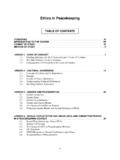Transcription of Indian Environment: UNIT 4 UNDERSTANDING …
1 Indian environment : The Changing Scenario unit 4 UNDERSTANDING HUMAN BEHAVIOUR Objectives After going through this unit you should be able to understand: importance of UNDERSTANDING human behaviour. Structure Introduction Models to Understand Human Behaviour Implications for the Organisation Personality Determinants of Personality Type and Trait Approaches to Personality Theories of Personality Importance of Personality Attitudes Attitudes and Organisation Values Socialisation's Influence on Personality, Values and Attitudes Schein Socialisation Model Summary Self-Assessment Questions Further Readings INTRODUCTION It is very essential to understand human behaviour in today's world as the existence of the organisation depends op the employees/individuals. Without UNDERSTANDING human behaviour it is very difficult to work in an organisation.
2 In order to understand human behaviour let us see how the perception of human being has changed from time to time. All organisations are composed of individuals, with different personality, attitudes, values, perception, motives, aspirations and abilities. The main reason to understand behaviour is that individuals are different. No two individuals are similar. In the early studies, theories of organisation and management treated people as though they were the same; scientific management was based on the similarities among workers, not the differences. In contrast, modern theories of human behaviour are based upon the differences among people and how those differences can affect the organisation. Individual differences are many for example some employees are motivated to work and some are not. This can be due to several reasons, and can be known by further reading the unit .
3 Before we proceed to understand human behaviour, it is better to know what the term `behaviour' means. Behaviour can be defined as a response/s which is observed directly/indirectly. Direct observation is possible by studying the responses of people to a work environment . Indirect observations are decision 5 Social Processes and Issues 6 making processes and attitudes, in terms of results or how people describe them verbally. Human behaviour is very much unpredictable. In behaviour we cannot assume one set pattern of behaviour. Lavitt classified behaviour as: (i) Caused behaviour, (ii) Motivated behaviour, (iii) Goal oriented behaviour. From these observations it can be understood that behaviour is a dependent factor. By UNDERSTANDING behaviour one can predict, direct, change and control behaviour of individuals or group. There are generally four basic assumptions regarding nature of people: individual differences, a whole person, caused behaviour (motivation) and value of the person (human dignity).
4 In an organisational set up it is essential for managers to understand behaviour. as they are constantly with people, interacting with them in terms of communication (either written or oral) in terms of work (either by specifying the work and getting things done). UNDERSTANDING past behaviour is important for developing effective human skills, and it also provides a framework for predicting behaviour. It also gives an idea to managers as to how behaviour is similar in certain circumstances and changing in changing environmental conditions. Another skill which an effective manager or leader needs is the ability to direct, change and control behaviour. Managers have to understand that there are-going to be individual differences among the employees, as no individual is similar to other. Each individual is unique by themselves. Then one has to understand that each individual has to be taken care of as a whole person by taking care of.
5 His needs as well as training and making him up to date in terms of work. Ultimately human beings have to be treated with respect only then you can expect effective performance. With the following descriptions you will be able to understand the concept better. Dan's analyses the nature of people in terms of four assumptions. 1. Individual Differences Behaviour is the result of interaction between individual characteristics and the characteristics of the environment in which the behaviour occurs. Each person has a unique combination of characteristics. Some of these characteristics are present from birth; others develop over time. These can be called as inherited and learned characteristics. Although there are some inherited Table 1: Learned Characteristics and its Effect on Behaviour Characteristics Behaviour Relationship found Tolerance for conflict Perceived role conflict Less role conflict with greater tolerance for conflict Relative importance of Expressed job satisfaction "Extrinsic Managers" expressed less job satisfaction extrinsic versus intrinsic rewards Value or work ethic Attendance Stronger work ethic associated with greater attendance Diversity of interests Salary based measure High general interest of performance diversity associated with better performance Locus of control Experienced job stress More stress with emphasis on external locus of control 7 Indian environment : The Changing Scenario 2.
6 3. 4. characteristics, but these are very few, and not so significant. Learned characteristics are very important. Individual differences can be because of environment , personal and psychological factors. It is also due to physical and social factors. Learned characteristics are acquired as people grow, develop and interact with their environments. This is depicted by Table 1. `Environmental factors' are characteristics of the broader environment such as economic conditions, social and. cultural norms, and political factors that can affect the individuals behaviour. Personal factors include physical and personal attributes , age, sex, race, education and abilities, psychological factors are less observable. They are mental characteristics and attributes such as values, attitudes, personality and aptitudes that affect behaviour through complex psychological processes.
7 These are studied, in the subsequent units. All aspects of the physical world that can be seen, heard, felt, smelled or touched are part of the physical environment of behaviour. The social environment of an individual includes relationships with family, friends, co-workers, supervisors and subordinates and membership in groups such as unions. The behaviour of others (as distinct from the individuals relationship with them) is also part of an individual's social environment . Any 'norms, rules, laws or reward systems that originate with other individuals or groups help to form an individual's social environment . A Whole Person When an employee works in an organisation, the organisation takes care of that person by making him effective, as a worker and as a person. Caused Behaviour (Motivation) People's behaviour is need based. By fulfilling these needs he is motivated positively and there occurs effective performance.
8 So the management in the organisation has to take care of these needs in order to have an effective performance. The management can show them how certain actions will increase their need fulfilment and if not; how it decreases their need fulfilment. Value of the Person (Human Dignity) People have to be treated with respect and as individuals and they can not be treated like machines as how scientific management use to treat them. By recognising them and treating them with uniqueness the value of the person gets increased. By this we can understand how the concept of treating human beings from machines to human capitals have evolved. If one accepts the fact that human skill development is necessary then managers and leaders must have necessary UNDERSTANDING in order to influence the behaviour of other people. It was felt that the managers acquire three levels of expertise. Firstly they have to understand the past and current behaviour, so that they are able to predict behaviour and than they learn to direct change, and control behaviour.
9 MODELS TO UNDERSTAND HUMAN BEHAVIOUR Early classical approaches made the assumptions that people are naturally lazy and self-serving, neutral, or positive and self-motivated. In simpler terms they need to be pushed and controlled and kept under surveillance, never to be trusted to put in a good day's work by themselves. Economic rewards were the only one considered, and close autocratic supervision was suggested. Systems and contingency theorists viewed people as adaptable and felt that much of behaviour was learned and not attributable to predispositions to be negative or positive. Social Processes and Issues 8 Likert, Mc Gregor and Bennis who developed and extended the findings of human-relations theorists had a positive view of human nature. Employees were seen as striving for personal and social well-being. If left alone, they would work hard for the intrinsic satisfaction of a job well done- The emphasis was on democratic decision making and leadership.
10 Jobs were to be challenging and allowed the individual employee to be creative. Models of Human Behaviour Psychoanalytic Model: Freudian approach depends on conflict model of humans. By using clinical techniques of free association and psychotherapy Freud felt that behaviour is not always consciously explained. "Unconscious" is the major factor which guides the individual's behaviour. Freud felt that the individual's behaviour depends on three factors: (i) id, (ii) Ego and (iii) Super ego. Id: By Id it means pleasure. To certain degree of having Id in an individual is constructive but may also lead to destructive tendencies like being aggressive, dominating, fighting and generally destroy. This kind of instinctive is more dominating in childhood. But once individuals develop and mature they learn to control the id. But it is always unconscious.









